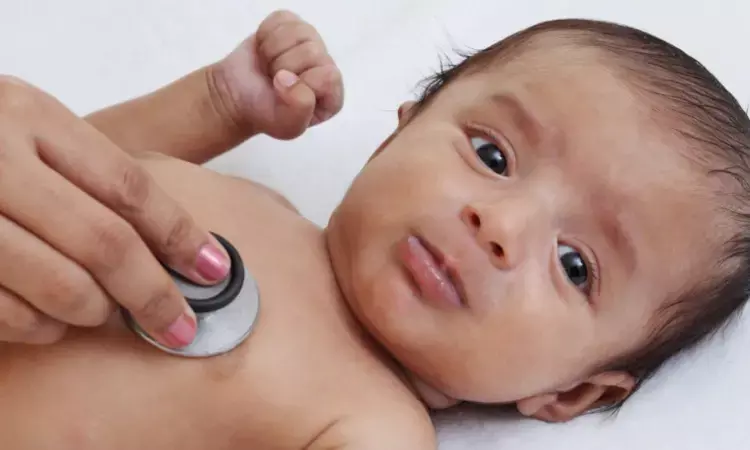- Home
- Medical news & Guidelines
- Anesthesiology
- Cardiology and CTVS
- Critical Care
- Dentistry
- Dermatology
- Diabetes and Endocrinology
- ENT
- Gastroenterology
- Medicine
- Nephrology
- Neurology
- Obstretics-Gynaecology
- Oncology
- Ophthalmology
- Orthopaedics
- Pediatrics-Neonatology
- Psychiatry
- Pulmonology
- Radiology
- Surgery
- Urology
- Laboratory Medicine
- Diet
- Nursing
- Paramedical
- Physiotherapy
- Health news
- Fact Check
- Bone Health Fact Check
- Brain Health Fact Check
- Cancer Related Fact Check
- Child Care Fact Check
- Dental and oral health fact check
- Diabetes and metabolic health fact check
- Diet and Nutrition Fact Check
- Eye and ENT Care Fact Check
- Fitness fact check
- Gut health fact check
- Heart health fact check
- Kidney health fact check
- Medical education fact check
- Men's health fact check
- Respiratory fact check
- Skin and hair care fact check
- Vaccine and Immunization fact check
- Women's health fact check
- AYUSH
- State News
- Andaman and Nicobar Islands
- Andhra Pradesh
- Arunachal Pradesh
- Assam
- Bihar
- Chandigarh
- Chattisgarh
- Dadra and Nagar Haveli
- Daman and Diu
- Delhi
- Goa
- Gujarat
- Haryana
- Himachal Pradesh
- Jammu & Kashmir
- Jharkhand
- Karnataka
- Kerala
- Ladakh
- Lakshadweep
- Madhya Pradesh
- Maharashtra
- Manipur
- Meghalaya
- Mizoram
- Nagaland
- Odisha
- Puducherry
- Punjab
- Rajasthan
- Sikkim
- Tamil Nadu
- Telangana
- Tripura
- Uttar Pradesh
- Uttrakhand
- West Bengal
- Medical Education
- Industry
Edoxaban emerges as effective anticoagulant option in children with cardiac disease, JACC study.

Standard of care (SOC) anticoagulation for thromboembolism (TE) prevention in children with cardiac disease includes low molecular weight heparins or vitamin K antagonists (VKAs). Limited data exists for alternate use of NOACs in children. In the recently published ENNOBLE-ATE trial, authors Portman et al have shown that Edoxaban is a potential alternative mode of thromboprophylaxis in children with cardiac disease showing low rates of clinically relevant bleeding (CRB) and TEs.
Currently, the agents mostly used for thromboprophylaxis in children with cardiac disease are antiplatelets such as aspirin and clopidogrel and anticoagulants such as low-molecular-weight heparin and vitamin K antagonists. DOACs have the advantage of a rapid onset and offset of action, few drug and food interactions, and linear pharmacokinetic variables with no need for routine monitoring.
To obtain safety and efficacy data for edoxaban in children, authors performed a phase 3, multinational, prospective, randomized, open-label, blinded-endpoint trial in patients <18 years of age with cardiac disease.
Patients were randomized 2:1 to age- and weight-based oral edoxaban once daily vs SOC for 3 months (main study period), stratified by cardiac diagnosis. Both groups could continue in an open-label edoxaban extension arm through 1 year. The primary endpoint was adjudicated clinically relevant bleeding (CRB). The main secondary endpoint was symptomatic TE or asymptomatic intracardiac thrombosis.
One patient per group experienced a nonmajor CRB in the main period. Treatment-emergent adverse events occurred in 46.8% with edoxaban and 41.4% with SOC. One SOC patient experienced 2 TE events (DVT with PE).
Among 147 children in the extension, 1 CRB event (0.7%) and 4 TEs occurred.
Edoxaban given once daily offers an attractive advantage to children with cardiac disease and may improve compliance compared with oral vitamin K antagonists. In the current study, the compliance rate was 94% in the edoxaban arm and 45% in the SOC arm.
"Pediatric thrombosis research remains challenging, and the main limitation of this study is the rarity of the primary and secondary outcomes", notes Nadine F. Choueiter in an accompanying editorial.
Source: JACC:
1. J Am Coll Cardiol. 2022 Dec, 80 (24) 2301–2310
2. J Am Coll Cardiol. 2022 Dec, 80 (24) 2311–2313
MBBS, MD , DM Cardiology
Dr Abhimanyu Uppal completed his M. B. B. S and M. D. in internal medicine from the SMS Medical College in Jaipur. He got selected for D. M. Cardiology course in the prestigious G. B. Pant Institute, New Delhi in 2017. After completing his D. M. Degree he continues to work as Post DM senior resident in G. B. pant hospital. He is actively involved in various research activities of the department and has assisted and performed a multitude of cardiac procedures under the guidance of esteemed faculty of this Institute. He can be contacted at editorial@medicaldialogues.in.
Dr Kamal Kant Kohli-MBBS, DTCD- a chest specialist with more than 30 years of practice and a flair for writing clinical articles, Dr Kamal Kant Kohli joined Medical Dialogues as a Chief Editor of Medical News. Besides writing articles, as an editor, he proofreads and verifies all the medical content published on Medical Dialogues including those coming from journals, studies,medical conferences,guidelines etc. Email: drkohli@medicaldialogues.in. Contact no. 011-43720751


